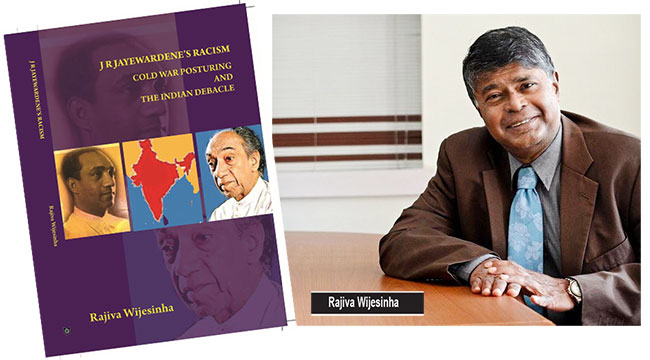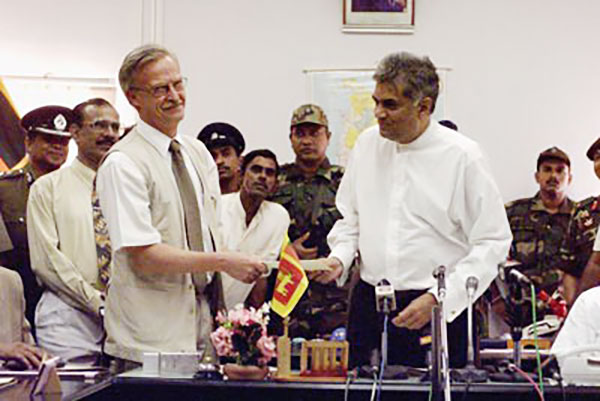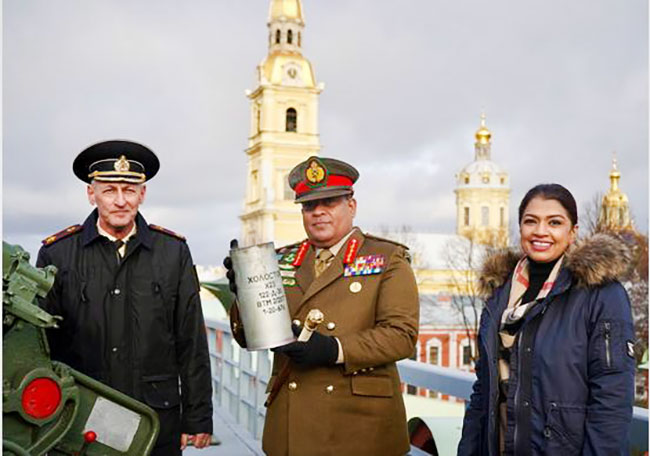SPECIAL REPORT : Part 395
New biography:
In addition to his political biography of J R Jayewardene, Godage & Bros published last month another book of travel by Rajiva Wijesinha. Around and About the Mediterranean covers journeys over half a century to Southern Europe, Northern Africa, and the Levant from Jordan up to Turkey. It also includes travel to the Balkans, Yugoslavia in 1972 and then the separate countries of the former Yugoslavia in the last five years.
Bringing together the Classical and the Christian and the Islamic cultures of the region makes for a fascinating read for it shows the intermingling that has made the Mediterranean so productive of ideas as well as artefacts. In addition, the book shares with readers the sheer joy of travel, the wonders seen and the pleasure of strenuous exploring followed by relaxation in scenic surroundings. There are several colour pictures as well as black and white ones to illustrate each section.
By Shamindra Ferdinando
An opportunity to peruse Prof. Rajiva Wijesinha’s critical biography of Sri Lanka’s first executive President (not elected), titled ‘J.R. JAYEWARDENE’S RACISM, COLD WAR POSTURING AND THE INDIAN DEBACLE’, couldn’t have been received at a better time.
The country is in turmoil with a wave of protests, with farmers’ now leading the way over the SLPP government agricultural policy, a simmering dispute with China regarding a ship carrying allegedly contaminated carbonic fertiliser consignment entering Sri Lankan waters, unprecedented balance of payment crisis, and a deepening disagreement with SLPP constituents over a deal with the US company New Fortress Energy, as well as foreign policy issues.
Can Sri Lanka’s current predicament be blamed on the executive presidential system, failure on the part of Parliament and the judiciary – the three pillars on which the country’s political system is based? Academic, administrator and ex-lawmaker who had represented the utterly corrupt SLFP and UNP-led political groupings (2010-2015 in Parliament), Prof. Wijesinha has launched this devastating attack on the late UNP leader JRJ but, overall, the JRJ biography seemed an extremely harsh critique on the political setup he established. But, the irony is the author himself had been part of the two major political groupings after having performed an immensely valuable role as the Secretary General of the Secretariat for Coordinating Peace Process (SCOPP) in addition to being the Secretary to the Disaster Management and Human Rights Ministry.
The writer really appreciate an opportunity to review ‘J.R. JAYEWARDENE’S RACISM, COLD WAR POSTURING AND THE INDIAN DEBACLE’ against the backdrop of The Island celebrating its 40th anniversary at a time the country is experiencing an unprecedented financial crisis. Prof. Wijesinha has basically dealt with the period The Island and its sister paper, Divaina played a critically important role.
Before delving into Prof. Wijesinha’s quite useful analysis, it would be pertinent to mention that as a UPFA National List MP, the academic, in spite of strong opposition from a section of his Liberal Party, voted for the dictatorial 18th Amendment to the Constitution that was passed on Sept. 18, 2010. The 18th Amendment that had been brought in at the expense of the 17th, introduced during Chandrika Bandaranaike Kumaratunga’s tenure as the President, literally placed the executive, the legislature and the judiciary under the President’s thumb. The judiciary cannot absolve itself of the responsibility for protecting and nurturing the Constitution if/when the executive or Parliament violated the Constitution, or both did, simultaneously. The UPFA initiated impeachment proceedings, close on the heels of the Supreme Court having deemed actions taken against then CJ Shirani Bandaranayake constitutional. Bandaranayake was accused of financial impropriety and interfering in legal cases among other allegations- all of which she denied, but her husband was involved in some banking shenanigans and he was convicted.
Wijesinghe, as an MP, however abstained from backing the impeachment motion against then C J Bandaranayake in early January 2013. A year later, Prof. switched his allegiance to a high profile yahapalana political project, spearheaded by the late Ven. Maduluwawe Sobitha Thera and Ven. Atureliye Rathana, MP (now NL MP of Ape Jana Bala Pakshaya) that facilitated the break-up of the powerful UPFA and the emergence of long standing SLFP General Secretary Maithripala Sirisena as the Opposition presidential candidate.
With Sirisena taking over as the President in January 2015, Prof. Wijesinha received appointment as State Minister of Higher Education. However, Prof. Wijesinha resigned on Feb 17, 2015 opposing the then Premier Ranil Wickremesinghe’s move to secure executive powers for himself as the Prime Minister. Prof. Wijesinha declared the move to gazette the 19th Amendment to the Constitution and transfer of executive powers to the Prime Minister was both ill-timed and a wrong decision, thus, he could no longer be a part of the yahapalana government.
Prof. Wijesinha alleged in Parliament the transfer of executive powers to the Prime Minister was extremely dangerous when one considered the way the UNP leader was conducting himself. Prof. Wijesinha certainly didn’t receive public appreciation for shifting of allegiances from various political alliances within a very short period, first to the short-lived Sirisena–Wickemesinghe combination, and then declare support for Sirisena, at the expense of Wickremesinghe, and finally ending up with those who he abandoned in 2014. Sirisena, who led the charge against the Rajapaksas, had ended up among the same group whom he accused earlier of planning to assassinate him.
Jeyaraj’s arrest in the wake of Indo-Lanka Accord
Prof. Wijesinha dealt with how the JRJ government arrested the then The Island journalist David Buell Sabapathy Jeyaraj over the reportage of the Indian Army offensive in the Jaffna peninsula. The former parliamentarian reproduced an apt section of Jeyaraj’s report that discussed the ground situation in the peninsula. Having joined The Island, in June 1987, the writer remembers the subsequent developments that paved the way for Jeyaraj to leave for the US. The versatile writer ended up in Canada. New Delhi continuously interfered with print media coverage of the violence in the Northern and Eastern parts where the Indian Peace Keeping Force waged a bloody campaign to tame the Liberation Tigers of Tamil Eelam (LTTE) after it turned its wrath against them.
Once the Criminal Investigation Department (CID) sleuths visited The Island editorial to question Norman Palihawadana over his coverage of atrocities committed by the Indian Army in the Eastern theatre of operations. Jeyaraj left the country in Sept 1988, over a year after India ended its disastrous military mission here. The prolific writer for the first time returned to Sri Lanka in Oct 2013 – four years after the military eradicated the LTTE completely.
The section on the Provincial Council legislation, when examined with how JRJ handled the judiciary, is thought-provoking and is evidence the legislature lacks the strength to counter overwhelming executive (dictatorial) powers, regardless of opposition by some lawmakers. The resignation of the late much respected Gamani Jayasuriya over the passage of Provincial Council legislation is a case in point.
‘J.R. JAYEWARDENE’S RACISM, COLD WAR POSTURING AND THE INDIAN DEBACLE’ published by S. Godage and Brothers should be made available in the library of the Parliament .The author should consider getting the book translated to Sinhala and Tamil, too, for the benefit of lawmakers unable to make use of the JRJ biography. The writer brought the new book to the attention of the Chief Librarian of Parliament and the pivotal importance of making it available to the lawmakers, over the last weekend.
Prof. Wijesinha discussed how JRJ brazenly amended and manipulated the Constitution, suppressed internal dissent and if the dictator had his way he would have deprived Ranasinghe Premadasa of an opportunity to contest the 1989 presidential election. At the onset of his new book, Prof. Wijesinha pointed out how JRJ brought in his first amendment to the Constitution to subvert a judgment of the courts.
Corruption becomes way of life
Prof. Wijesinha boldly discussed the impact the absolutely corrupt political system in place as a result of deterioration of parliamentary norms is having on the country. The latest JRJ autobiography has contradicted those who published hagiographies of the former President. Prof. Wijesinha compared the late JRJ with Ranil Wickemesinghe whom he described as JRJ’s spiritual heir. Having referred to their strategies in dealing with Tamil speaking people, Prof. Wijesinha repeated his long standing claim of Wickremesinghe bribing SLMC leader Rauff Hakeem in 2014 to win over his support ahead of the 2015 presidential election. Wijesinha first made the accusation in a widely watched Sirasa ‘Pathikada’ programme anchored by the late Bandula Jayasekera, one-time presidential spokesman and the writer’s colleague at The Island editorial. Prof. Wijesinha says Muslim politicians continue to cross up and down, depending on what they are offered.
Prof. Wijesinha publicly alleged years before the launch of JRJ biography how the Commission to Investigate Allegations of Bribery or Corruption (CIABOC) sat on his complaint on the bribery accusation. The academic declared that the UNP received money to engineer a crossover of over a dozen People’s Alliance lawmakers in 2000 from businessman Nahil Wijesuriya.
Referring to the Rubber-Rice pact with China finalised in 1952 and the despicable role played by JRJ, Prof. Wiejsinha briefly examined the 99-year-old lease on the strategic Hambantota port in 2017. Prof. Wijesinha blamed the then President Sirisena, Premier Wickremesinghe and International Trade Minister Malik Samarawickrema for the Hambantota sell-out to varying degrees. The author quite rightly faulted an influential section of the media for continuously attacking the Rajapaksas for selling family silver to the Chinese whereas the UNP-led administration pushed through the deal.
The incumbent government has had no option but to accept the controversial Hambantota deal. Interestingly, the government is now under fire for giving into the US strategy to take over Sri Lanka’s energy security. The author of the JRJ biography may not agree with the writer, but the undeniable truth is all governments since the advent of UNP at the 1977 parliamentary election contributed to the deterioration of democracy and sovereignty. The 20th Amendment enacted in Oct 2020 with a 2/3 majority is a case in point. With the advent of the 20th Amendment, the much discussed abolition of the executive presidency or curbing of its powers will not be subject to discussion though some may make some statements opposed to the executive presidential system.
Perhaps Prof. Wijesinha should have discussed how Wickremesinghe received the premiership in January 2015 in the aftermath of Sirisena’s victory. JRJ’s political strategy has been exploited by interested parties to deceive the public that victory at the presidential election provided a mandate for them to take over the government. Sirisena and Wickremesinghe did exactly that. If not for the manipulation of the system, Wickremesinghe wouldn’t have received the premiership in January 2015. Prof. Wijesinha wouldn’t have to resign in Feb 2015 and Treasury bond scams would not have been perpetrated.
JRJ biography in three parts
The civil society, the diplomatic community, the media and the general public can benefit from Prof. Wijesinha’s incisive thinking. In part I, the author discussed (a) overview of JRJ’s political perspectives (b) Tamil parties (c) much amended Constitution (d) election and having ministers at his whim and fancy (e) 1982 Referendum. Basically, part 1 dealt with the building up of the colossal power base. Part 11 discussed (a) alienation of Tamils (b) riots after killing of 13 soldiers in Jaffna (c) slide towards concessions (d) Indian interventions and (e) Indian military deployment. This section was aptly titled ‘A slow but relentless decline.’
The final part titled ‘And the Fall’ dealt with (a) Indo-Lanka Accord (b) India’s war against the LTTE (c) elections and increasing violence and (d) a new President.
The writer found Chapter 5 that examined the 1982 Referendum meant to prolong the life of Parliament regardless of consequences. JRJ introduced the 4th Amendment which Prof. Wiejsinha described as the worst of the then UNP leader’s constitutional amendments that paved the way for his party to rule the country from 1977 to 1989. The JRJ strategy ruined the country. The second JVP inspired insurgency, India inspired Tamil terrorism and trade union disputes wrecked the country during this period. Prof. Wijesinha lucidly explained how the then Attorney General Siva Pasupathy, who subsequently threw his weight behind the LTTE and Chief Justice Neville Samarakoon reacted to the controversial move.
Prof. Wijesinha called Pasupathy an obsequious man who had no qualms in his ‘pernicious bidding’ and Samarakoon as JRJ’s handpicked man was truly forthright. Prof. Wijesinha coverage of the judiciary’s response to a despicable move to extend the life of Parliament provides an opportunity for those interested in contemporary history to understand how the executive, the legislature and the judiciary collectively caused irreparable damage to the democratic system.
The assassination of actor-turned politician Vijaya Kumaratunga in Feb 1988 should be examined taking into consideration Prof. Wijesinha’s comment on the UNP strategy meant to politically destroy the much loved man. Having had categorised Kumaratunga as a Naxalite, the UNP imprisoned him during the dubious 1982 Referendum campaign. Let me reproduce verbatim what Prof. Wijesinha stated on alleged Naxalite plot: “Gamini Dissanayake, who was then firmly under JR’s thumb, also got in on the act and claimed that ‘the leader of the Naxalites is Vijaya Kumaratunga’ and his assistant Chandrika. Meanwhile, The Sunday Times, which was then fully controlled by the government, with the easily intimidated Rita Sebastian as its editor, published a list of eight Naxalites, namely, in order (1) Vijaya Kumaratunga (2) Chandrika Kumaratunga (3) Ratnasiri Wickramanayake (4) Hector Kobbekaduwa (5) T.B. Illangaratne (6) K.P. Silva (General Secretary, Communist Party), (7) G.S.P. Ranaweera (Editor, Aththa) and (8) Jinadasa Niyathapala.
Prof. Wijesinha commented on the media, including the birth of the Upali Newspapers Limited (UNL) and the disappearance of its founder Upali Wijewardene in the wake of Ranasinghe Premadasa thwarting JRJ’s move to field the top entrepreneur to contest the Kalawana electorate. The UNL received Prof. Wijesinha’s appreciation for opposing the Referendum, though mildly, whereas the state-owned media and Dawasa Group threw their full weight behind JRJ’s despicable move. The government engaged in violence in support of its political project. The author discussed how JRJ unashamedly used sections of the media and selected journalists for the project that gave his party the opportunity to govern the country for a period of 13 years, sans parliamentary elections.
A bizarre strategy
Prof. Wijesinha explained how JRJ adopted bizarre political strategies. Having undated letters of resignation from his MPs is one such shameful tactic. JRJ played politics with the system to restrict the number of by elections (remember, this was before the introduction of the PR system in 1989). The section titled ‘Flexing muscles in 1983’ under Chapter 5: Referendum underscored how JRJ consolidated unbridled power at the expense of Parliament and the Judiciary. JRJ ruined institutions at will. Parliament was among them. During a recent interview on ‘Siyatha’ , one-time President Maithripala Sirisena explained how successive Presidents brought in Amendments to consolidate their power at the expense of the people. Sirisena, quite rightly claimed that he was the only President to give up power by way of introducing the 19th Amendment to the Constitution in 2015. However, the irony is Sirisena, in his capacity as the SLFP leader, allowed his parliamentary group to vote for the 20th Amendment that neutralised the 19th. Lawmaker Sirisena quite conveniently refrained from voting for the 20th Amendment having explained his predicament to President Gotabaya Rajapaksa. Having accused the Rajapaksas of planning to bury him, Sirisena, who has been named in the Easter Sunday Commission report for possible prosecution for dereliction of duty, ended up as an SLPP lawmaker.




 Combined Sri Lankan armed forces, however, conducted a relentless campaign, over a period of two years and 10 months, until Velupillai Prabhakaran was trapped in the one-time LTTE stronghold Mullaitivu. Prabhakaran was killed the day after the then General Sarath Fonseka’s Army declared the end of the war, on May 18, 2009. The Vijayabahu Infantry Regiment (VIR) was credited with the killing of Prabhakaran and recovery of his body more or less intact.
Combined Sri Lankan armed forces, however, conducted a relentless campaign, over a period of two years and 10 months, until Velupillai Prabhakaran was trapped in the one-time LTTE stronghold Mullaitivu. Prabhakaran was killed the day after the then General Sarath Fonseka’s Army declared the end of the war, on May 18, 2009. The Vijayabahu Infantry Regiment (VIR) was credited with the killing of Prabhakaran and recovery of his body more or less intact.